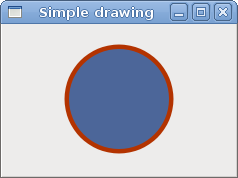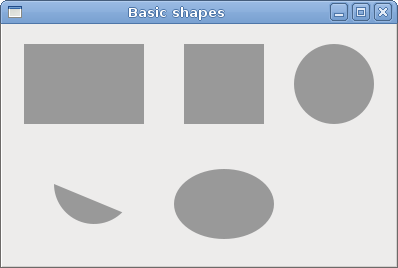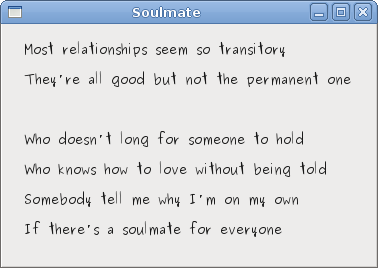Drawing with Cairo in PyGTK
In this part of the PyGTK programming tutorial, we will do some drawing with the Cairo library.Cairo is a library for creating 2D vector graphics. We can use it to draw our own widgets, charts or various effects or animations.
Simple drawing
The stroke operation draws the outlines of shapes and the fill operation fills the insides of shapes. Next we will demonstrate these two operations.simpledrawing.py
#!/usr/bin/pythonIn our example, we will draw a circle and will it with a solid color.
# ZetCode PyGTK tutorial
#
# This code example draws a circle
# using the cairo library
#
# author: jan bodnar
# website: zetcode.com
# last edited: February 2009
import gtk
import math
class PyApp(gtk.Window):
def __init__(self):
super(PyApp, self).__init__()
self.set_title("Simple drawing")
self.resize(230, 150)
self.set_position(gtk.WIN_POS_CENTER)
self.connect("destroy", gtk.main_quit)
darea = gtk.DrawingArea()
darea.connect("expose-event", self.expose)
self.add(darea)
self.show_all()
def expose(self, widget, event):
cr = widget.window.cairo_create()
cr.set_line_width(9)
cr.set_source_rgb(0.7, 0.2, 0.0)
w = self.allocation.width
h = self.allocation.height
cr.translate(w/2, h/2)
cr.arc(0, 0, 50, 0, 2*math.pi)
cr.stroke_preserve()
cr.set_source_rgb(0.3, 0.4, 0.6)
cr.fill()
PyApp()
gtk.main()
darea = gtk.DrawingArea()We will be doing our drawing operations on the DrawingArea widget.
darea.connect("expose-event", self.expose)
We do all drawing in a method, that is a handler for the expose-event signal. cr = widget.window.cairo_create()We create the cairo context object from the gdk.Window of the drawing area. The context is an object that is used to draw on all Drawable objects.
cr.set_line_width(9)We set the width of the line to 9 pixels.
cr.set_source_rgb(0.7, 0.2, 0.0)We set the color to dark red.
w = self.allocation.widthWe get the width and height of the drawing area. We move the origin into the middle of the window.
h = self.allocation.height
cr.translate(w/2, h/2)
cr.arc(0, 0, 50, 0, 2*math.pi)We draw the outside shape of a circle. In red color. The stroke_preserve() strokes the current path according to the current line width, line join, line cap, and dash settings. Unlike the stroke(), it preserves the path within the cairo context.
cr.stroke_preserve()
cr.set_source_rgb(0.3, 0.4, 0.6)This fills the interior of the circle with some blue color.
cr.fill()

Figure: Simple drawing
Basic shapes
The next example draws some basic shapes onto the window.basicshapes.py
#!/usr/bin/pythonIn this example, we will create a rectangle, a square, a circle, an arc and an ellipse.
# ZetCode PyGTK tutorial
#
# This code example draws basic shapes
# with the cairo library
#
# author: jan bodnar
# website: zetcode.com
# last edited: February 2009
import gtk
import math
class PyApp(gtk.Window):
def __init__(self):
super(PyApp, self).__init__()
self.set_title("Basic shapes")
self.set_size_request(390, 240)
self.set_position(gtk.WIN_POS_CENTER)
self.connect("destroy", gtk.main_quit)
darea = gtk.DrawingArea()
darea.connect("expose-event", self.expose)
self.add(darea)
self.show_all()
def expose(self, widget, event):
cr = widget.window.cairo_create()
cr.set_source_rgb(0.6, 0.6, 0.6)
cr.rectangle(20, 20, 120, 80)
cr.rectangle(180, 20, 80, 80)
cr.fill()
cr.arc(330, 60, 40, 0, 2*math.pi)
cr.fill()
cr.arc(90, 160, 40, math.pi/4, math.pi)
cr.fill()
cr.translate(220, 180)
cr.scale(1, 0.7)
cr.arc(0, 0, 50, 0, 2*math.pi)
cr.fill()
PyApp()
gtk.main()
cr.rectangle(20, 20, 120, 80)These lines draw a rectangle and a square.
cr.rectangle(180, 20, 80, 80)
cr.fill()
cr.arc(330, 60, 40, 0, 2*math.pi)Here the arc() method draws a full circle.
cr.fill()
cr.scale(1, 0.7)If we want to draw an oval, we do some scaling first. Here the scale() method shrinks the y axis.
cr.arc(0, 0, 50, 0, 2*math.pi)
cr.fill()

Figure: Basic shapes
Colors
A color is an object representing a combination of Red, Green, and Blue (RGB) intensity values. Cairo valid RGB values are in the range 0 to 1.colors.py
#!/usr/bin/pythonWe draw three rectangles in three different colors.
# ZetCode PyGTK tutorial
#
# This program shows how to work
# with colors in cairo
#
# author: jan bodnar
# website: zetcode.com
# last edited: February 2009
import gtk
class PyApp(gtk.Window):
def __init__(self):
super(PyApp, self).__init__()
self.set_title("Colors")
self.resize(360, 100)
self.set_position(gtk.WIN_POS_CENTER)
self.connect("destroy", gtk.main_quit)
darea = gtk.DrawingArea()
darea.connect("expose-event", self.expose)
self.add(darea)
self.show_all()
def expose(self, widget, event):
cr = widget.window.cairo_create()
cr.set_source_rgb(0.2, 0.23, 0.9)
cr.rectangle(10, 15, 90, 60)
cr.fill()
cr.set_source_rgb(0.9, 0.1, 0.1)
cr.rectangle(130, 15, 90, 60)
cr.fill()
cr.set_source_rgb(0.4, 0.9, 0.4)
cr.rectangle(250, 15, 90, 60)
cr.fill()
PyApp()
gtk.main()
cr.set_source_rgb(0.2, 0.23, 0.9)The set_source_rgb() method sets a color for the cairo context. The three parameters of the method are the color intensity values.
cr.rectangle(10, 15, 90, 60)We create a rectangle shape and fill it with the previously specified color.
cr.fill()

Figure: Colors
Transparent rectangles
Transparency is the quality of being able to see through a material. The easiest way to understand transparency is to imagine a piece of glass or water. Technically, the rays of light can go through the glass and this way we can see objects behind the glass.In computer graphics, we can achieve transparency effects using alpha compositing. Alpha compositing is the process of combining an image with a background to create the appearance of partial transparency. The composition process uses an alpha channel. (wikipedia.org, answers.com)
transparentrectangles.py
#!/usr/bin/pythonIn the example we will draw ten rectangles with different levels of transparency.
# ZetCode PyGTK tutorial
#
# This program shows transparent
# rectangles using cairo
#
# author: jan bodnar
# website: zetcode.com
# last edited: February 2009
import gtk
class PyApp(gtk.Window):
def __init__(self):
super(PyApp, self).__init__()
self.set_title("Transparent rectangles")
self.resize(590, 90)
self.set_position(gtk.WIN_POS_CENTER)
self.connect("destroy", gtk.main_quit)
darea = gtk.DrawingArea()
darea.connect("expose-event", self.expose)
self.add(darea)
self.show_all()
def expose(self, widget, event):
cr = widget.window.cairo_create()
for i in range(1, 11):
cr.set_source_rgba(0, 0, 1, i*0.1)
cr.rectangle(50*i, 20, 40, 40)
cr.fill()
PyApp()
gtk.main()
cr.set_source_rgba(0, 0, 1, i*0.1)The last parameter of the set_source_rgba() method is the alpha transparency.

Figure: Transparent rectangles
Soulmate
In the next example, we draw some text on the window.soulmate.py
#!/usr/bin/pythonWe display part of the lyrics from the Natasha Bedingfields Soulmate song.
# ZetCode PyGTK tutorial
#
# This program draws text
# using cairo
#
# author: jan bodnar
# website: zetcode.com
# last edited: February 2009
import gtk
import cairo
class PyApp(gtk.Window):
def __init__(self):
super(PyApp, self).__init__()
self.set_title("Soulmate")
self.set_size_request(370, 240)
self.set_position(gtk.WIN_POS_CENTER)
self.connect("destroy", gtk.main_quit)
darea = gtk.DrawingArea()
darea.connect("expose-event", self.expose)
self.add(darea)
self.show_all()
def expose(self, widget, event):
cr = widget.window.cairo_create()
cr.set_source_rgb(0.1, 0.1, 0.1)
cr.select_font_face("Purisa", cairo.FONT_SLANT_NORMAL,
cairo.FONT_WEIGHT_NORMAL)
cr.set_font_size(13)
cr.move_to(20, 30)
cr.show_text("Most relationships seem so transitory")
cr.move_to(20, 60)
cr.show_text("They're all good but not the permanent one")
cr.move_to(20, 120)
cr.show_text("Who doesn't long for someone to hold")
cr.move_to(20, 150)
cr.show_text("Who knows how to love without being told")
cr.move_to(20, 180)
cr.show_text("Somebody tell me why I'm on my own")
cr.move_to(20, 210)
cr.show_text("If there's a soulmate for everyone")
PyApp()
gtk.main()
cr.select_font_face("Purisa", cairo.FONT_SLANT_NORMAL,
cairo.FONT_WEIGHT_NORMAL)
Here we specify the font, that we use. cr.set_font_size(13)We specify the size of the font.
cr.move_to(20, 30)We move to the point, where we will draw the text.
cr.show_text("Most relationships seem so transitory")
The show_text() method draws text onto the window. 
Figure: Soulmate
In this chapter of the PyGTK programming library, we were drawing with the Cairo graphics library.
No comments:
Post a Comment